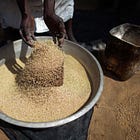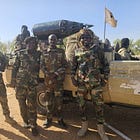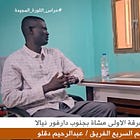Tribal leader Musa Hilal backs Sudan army and calls for ceasefire
Rival to Hemedti poses threat to RSF control in North Darfur
A key leader within the Rizeigat Arab tribe of Darfur has announced his “national stance,” saying he supports the “political and sovereign institutions” of Sudan, including the army, while also calling for a ceasefire.
Musa Hilal is the leader of the Mahamid Rizeigat, a different branch of the same tribe as the Rapid Support Forces leader Mohamed Hamdan Dagalo.
Hilal delivered a speech to hundreds of supporters in Um Sunt, North Darfur, in which he called on his fellow tribesmen to “stand up, stand strong with the homeland.”
Without mentioning the Rapid Support Forces by name, he nevertheless implicitly criticized it as a “militia” and mercenary group trying to lure Rizeigat and foreign mercenaries into the battlegrounds of central Sudan with promises of loot.
The Rizeigat Arabs of Darfur constitute the leadership of the RSF paramilitary and the original core of its manpower. Hilal’s opposition to the RSF therefore poses a threat to the RSF war effort generally, as well as RSF control in North Darfur in particular.
Hilal first rose to prominence during the Darfur genocide in the early to mid 2000s, when he was in his 40s. In press reports he was often identified as a leader of the ‘janjaweed’ militias that massacred non-Arabs and burned villages. Hilal is now in his early 60s and led a chequered political career.
After his initial support for the National Congress Party regime, he defected and formed his own armed group, called the Revolutionary Awakening Council in 2014. His stronghold of Mistariha was overrun by the RSF in 2017, after which he and his sons and brothers, and some of his top men, were arrested.
Hilal was taken to Khartoum in 2018 and put on trial in a military court, before being pardoned three years later by the new military junta. He returned to Darfur, where he returned to his role as a political and social leader in the years before the current war.
After the eruption of the war between the RSF and the Sudanese army in April last year, some observers questioned whether Hilal would enter the war. Al Jazeera, for instance, published an article titled, “Could an old tribal foe undercut Sudan’s Hemedti?” Although ultimately that turned out to be correct, Hilal initially stayed neutral for nearly a year, and some of his men and top commanders even joined the fighting on the side of the RSF, including his prominent long-time commander Ali Rizkallah, known as “Savanna.”
Moreover, until recently it looked as if relations between the RSF and Hilal were improving. In February, RSF commanders in North Darfur paid 900 million Sudanese pounds (US $1.5 million) to Hilal’s Revolutionary Awakening Council as "compensation" for cars and money that they had seized when they stormed his stronghold in the Misteriya area in 2017.
The Arabic-language publication Darfur 24 reported, “The step was the culmination of a series of meetings between Musa Hilal and some leaders of the RSF, which were later joined by about 50 tribal figures and leaders in Darfur states, where they contributed to bringing the positions between the two parties closer together.”
“Informed sources” said the RSF handed over the money in cash, and vehicles on February 12, in the presence of tribal leaders who had helped broker the deal.
Extended excerpt from Hilal’s speech
Hilal delivered the following remarks, as seen in widely circulating videos recorded in North Darfur earlier this week:
My dear people, I want you to take a real national stance and stand up for Sudan and strive for Sudan, and not be among those who hurt Sudan and stab Sudan in the back. Leave this to the absurdists, the anarchists, and the foreigners who invaded Sudan and were brought from Libya, from Chad, from Niger, from Nigeria, from Central Africa, from Eritrea, from Ethiopia. These mercenaries they bring to invade Sudan. We are not part of them, and we are not with them.
I ask all the families [of the tribe], and this message to be conveyed to all the families—everyone who begs them to go to the country’s capital in order to plunder and attack citizens and destroy the state. Send this message to everyone over whom you have guardianship, including your children, your brothers, your cousins, and everyone who hears your words: Stand up, strong stand with the homeland, with the stability of the homeland, for a ceasefire and an end to the war in Sudan.
This is what is required of a good citizen. The citizen is not required to destroy his country with his own hands, nor is the citizen required to accept the invasion of his country and homeland. From here, we stand with the state and with the nation.
This is our position: We stand with the state’s political and sovereign institutions, the economic institutions we mentioned, and the security institutions we mentioned, led by the Sudanese Armed Forces. From here, we stand with the Sudanese Armed Forces and not with any militia.
And whoever did not hear before that, will hear today, and it will be published today and say what he says, and what we say is the truth and not falsehood. We are with truth and we are not with falsehood. “Indeed, falsehood is bound to vanish” [quoting the Qur’an, Sura Al-Isra, verse 81]. “Indeed, falsehood is bound to vanish.” [crowd repeating/chanting]. “Indeed, falsehood is bound to vanish.”
We are with the war of dignity that returns Sudan to its natural position, returns Sudan to its stability, returns Sudan to its unity, and returns Sudan to its true political elite that leads the country with real leadership and leadership of the state, and returns Sudan to those who know and understand how the state is run.
We have now gathered in this place and at this time for a very simple and internal problem. Even if it is not a basta in the meaning, but rather a simple one in the circle that people in general read it with, it is a problem from a Chadian who came in 2018 to Sudan, the open-gate Sudan that received...”




